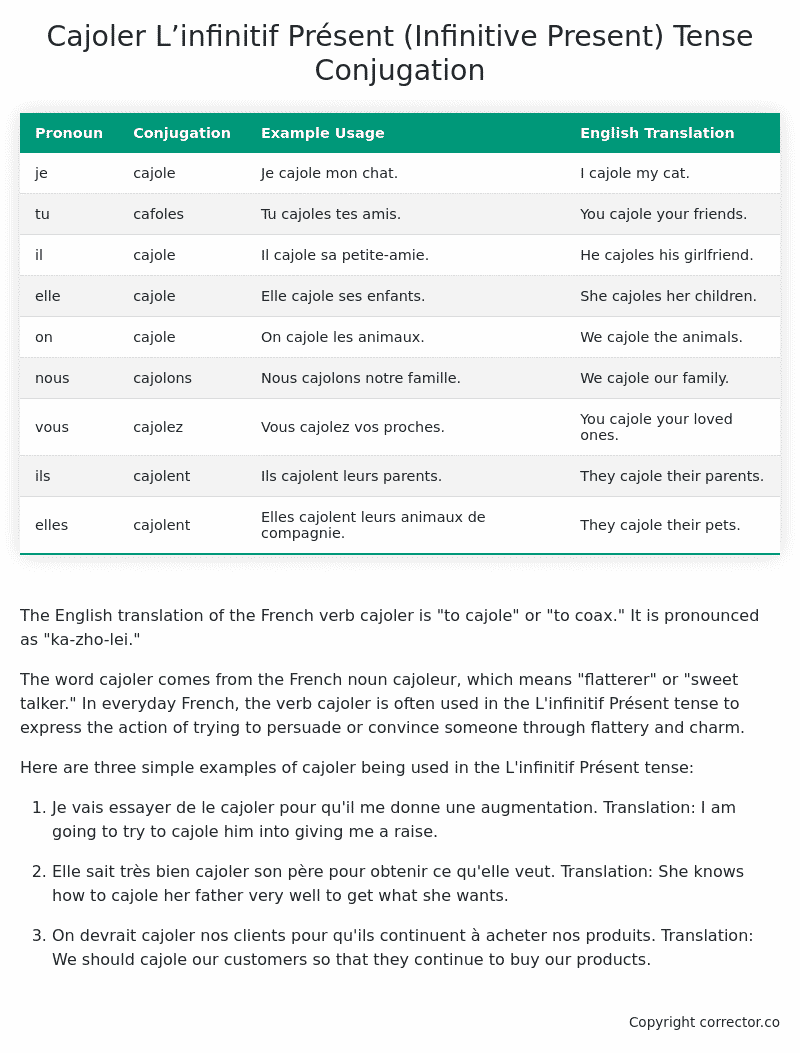L’infinitif Présent (Infinitive Present) Tense Conjugation of the French Verb cajoler
Introduction to the verb cajoler
The English translation of the French verb cajoler is “to cajole” or “to coax.” It is pronounced as “ka-zho-lei.”
The word cajoler comes from the French noun cajoleur, which means “flatterer” or “sweet talker.” In everyday French, the verb cajoler is often used in the L’infinitif Présent tense to express the action of trying to persuade or convince someone through flattery and charm.
Here are three simple examples of cajoler being used in the L’infinitif Présent tense:
-
Je vais essayer de le cajoler pour qu’il me donne une augmentation.
Translation: I am going to try to cajole him into giving me a raise. -
Elle sait très bien cajoler son père pour obtenir ce qu’elle veut.
Translation: She knows how to cajole her father very well to get what she wants. -
On devrait cajoler nos clients pour qu’ils continuent à acheter nos produits.
Translation: We should cajole our customers so that they continue to buy our products.
Table of the L’infinitif Présent (Infinitive Present) Tense Conjugation of cajoler
| Pronoun | Conjugation | Example Usage | English Translation |
|---|---|---|---|
| je | cajole | Je cajole mon chat. | I cajole my cat. |
| tu | cafoles | Tu cajoles tes amis. | You cajole your friends. |
| il | cajole | Il cajole sa petite-amie. | He cajoles his girlfriend. |
| elle | cajole | Elle cajole ses enfants. | She cajoles her children. |
| on | cajole | On cajole les animaux. | We cajole the animals. |
| nous | cajolons | Nous cajolons notre famille. | We cajole our family. |
| vous | cajolez | Vous cajolez vos proches. | You cajole your loved ones. |
| ils | cajolent | Ils cajolent leurs parents. | They cajole their parents. |
| elles | cajolent | Elles cajolent leurs animaux de compagnie. | They cajole their pets. |
Other Conjugations for Cajoler.
Le Present (Present Tense) Conjugation of the French Verb cajoler
Imparfait (Imperfect) Tense Conjugation of the French Verb cajoler
Passé Simple (Simple Past) Tense Conjugation of the French Verb cajoler
Passé Composé (Present Perfect) Tense Conjugation of the French Verb cajoler
Futur Simple (Simple Future) Tense Conjugation of the French Verb cajoler
Futur Proche (Near Future) Tense Conjugation of the French Verb cajoler
Plus-que-parfait (Pluperfect) Tense Conjugation of the French Verb cajoler
Passé Antérieur (Past Anterior) Tense Conjugation of the French Verb cajoler
Futur Antérieur (Future Anterior) Tense Conjugation of the French Verb cajoler
Subjonctif Présent (Subjunctive Present) Tense Conjugation of the French Verb cajoler
Subjonctif Passé (Subjunctive Past) Tense Conjugation of the French Verb cajoler
Subjonctif Imparfait (Subjunctive Imperfect) Tense Conjugation of the French Verb cajoler
Subjonctif Plus-que-parfait (Subjunctive Pluperfect) Tense Conjugation of the French Verb cajoler
Conditionnel Présent (Conditional Present) Tense Conjugation of the French Verb cajoler
Conditionnel Passé (Conditional Past) Tense Conjugation of the French Verb cajoler
L’impératif Présent (Imperative Present) Tense Conjugation of the French Verb cajoler
L’infinitif Présent (Infinitive Present) Tense Conjugation of the French Verb cajoler (this article)
Struggling with French verbs or the language in general? Why not use our free French Grammar Checker – no registration required!
Get a FREE Download Study Sheet of this Conjugation 🔥
Simply right click the image below, click “save image” and get your free reference for the cajoler L’infinitif Présent tense conjugation!

Cajoler – About the French L’infinitif Présent (Infinitive Present) Tense
Forming the Infinitive Present
Common Everyday Usage Patterns
As a Verb’s Dictionary Form
After Modal Verbs
As an Imperative
In Infinitive Clauses
Interactions with Other Tenses
Present Tense
Future Tense
Conditional Tense
Passé Composé
Imperfect Tense
Subjunctive and Conditional Moods
Summary
Want More?
I hope you enjoyed this article on the verb cajoler. Still in a learning mood? Check out another TOTALLY random French verb conjugation!


